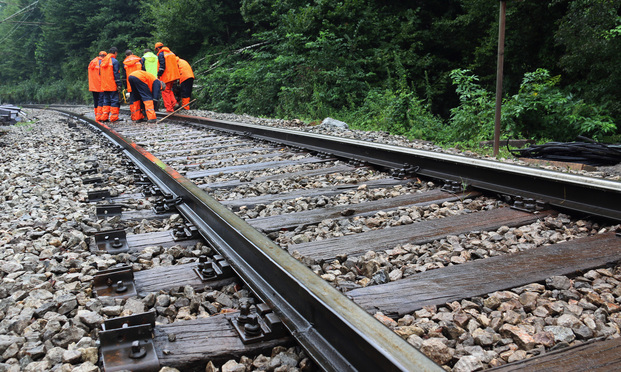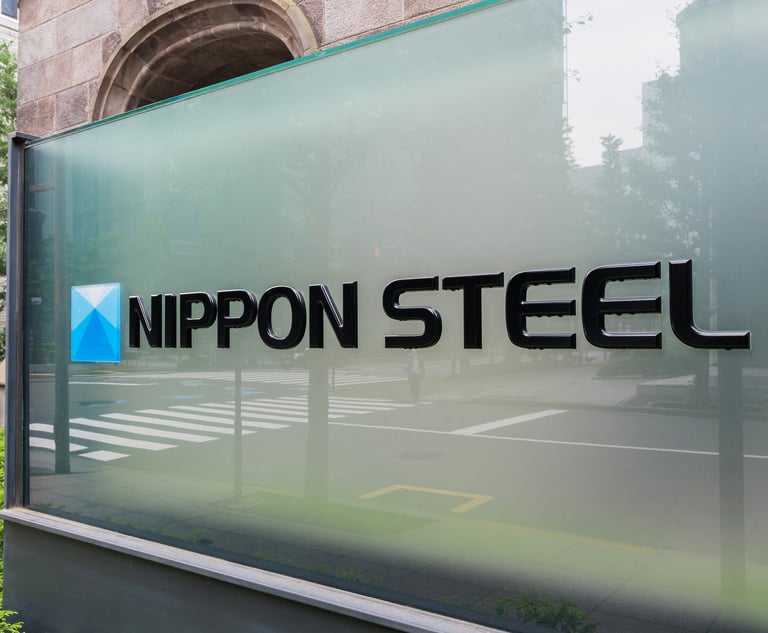Rail Equipment Makers Agree to Settle Claims Over 'No-Poach' Agreements for Nearly $49M
The class action stems from allegations that Knorr, Wabtec and a company that was later purchased by Wabtec entered into agreements where they would not poach each other's workers.
February 25, 2020 at 03:11 PM
3 minute read
 Photo: Shutterstock
Photo: Shutterstock
Two companies that make railroad equipment have agreed to pay nearly $49 million to resolve a class action lawsuit alleging that their so-called "no-poach" agreements violated antitrust law.
On Monday, attorneys from Lieff Cabraser Heimann & Bernstein and Fine, Kaplan and Black filed a motion for preliminary approval to settle the case In re Railway Industry Employee No-Poach Antitrust Litigation for $48.95 million. The settlement includes $12 million from equipment maker Knorr and $36.95 million from Wabtec, which develops electronic products for rail operations.
"These settlements were the product of extensive, hard-fought negotiations, provide significant payments to class members, and avoid the considerable risks, delays and expense of further litigation," Fine Kaplan attorney Roberta Liebenberg said in a press release announcing the settlement Tuesday. Liebenberg is serving as interim co-lead counsel in the litigation.
The brief outlining the settlement to the U.S. District Court for the Western District of Pennsylvania said the accord should provide an average recovery of $5,830 for each class member before attorney fees. The brief, however, did not include a specific request for fees, but said the court will determine the fee awards after co-lead counsels submit fee applications. The brief did request a reimbursement of about 715,000 in out-of-pocket expenses.
"We are very proud of this result," said Dean M. Harvey of San Francisco-based Lieff Cabraser, who is co-lead class counsel. "The settlements provide among the largest class member recoveries of any comparable case, and do so in record time."
The class action stems from allegations that Knorr, Wabtec and a company that was later purchased by Wabtec entered into agreements where they would not poach each other's workers. According to the plaintiffs' allegations, the labor market for rail industry employees is very competitive, as there is high demand and limited supply of skilled and experienced workers. The plaintiffs contended that lateral hiring is a key component of the market, and typically companies will directly solicit the employees of competitor companies.
However, according to the plaintiffs' allegations, around 2009 the companies agreed to not hire each other's employees without first getting consent from the other company. The plaintiffs argued that this kept their compensation rates at artificially low levels, and substantially hindered competition between the companies for workers, resulting in fewer job opportunities, suppressed wages and restricted job mobility.
The plaintiffs further said defendants kept the agreements secret, until the U.S. Department of Justice in April 2018 announced a settlement with the companies that barred them from continuing the no-poach practices.
According to the brief to the court, Knorr agreed to its portion of the settlement in August 2019, and that accord acted as an "icebreaker" for Wabtec to settle. The memo said recently retired Judge Thomas Vanaskie of the U.S. Court of Appeals for the Third Circuit oversaw the mediation sessions.
Baker McKenzie attorney Mark Hamer, who is representing Knorr, declined to comment on the proposed settlement. Melissa Tea of K&L Gates, who represented Wabtec, did not return a call seeking comment.
This content has been archived. It is available through our partners, LexisNexis® and Bloomberg Law.
To view this content, please continue to their sites.
Not a Lexis Subscriber?
Subscribe Now
Not a Bloomberg Law Subscriber?
Subscribe Now
NOT FOR REPRINT
© 2025 ALM Global, LLC, All Rights Reserved. Request academic re-use from www.copyright.com. All other uses, submit a request to [email protected]. For more information visit Asset & Logo Licensing.
You Might Like
View All
Pittsburgh's Reed Smith, K&L Gates Join Fight to Save Nippon Steel-U.S. Steel Merger

Kraft Heinz Hires GC of Industrial Manufacturer as Legal Chief

Mastercard CLO Exits After Just 14 Months, Takes Legal Reins of Laser Manufacturer
3 minute read
Black Worker Who Allegedly Faced Racist Harassment At Manufacturing Job Sues Employer, Staffing Company
Law Firms Mentioned
Trending Stories
- 1‘Catholic Charities v. Wisconsin Labor and Industry Review Commission’: Another Consequence of 'Hobby Lobby'?
- 2With DEI Rollbacks, Employment Lawyers See Potential For Targeting Corporate Commitment to Equality
- 3In-House Legal Network The L Suite Acquires Legal E-Learning Platform Luminate+
- 4In Police Shooting Case, Kavanaugh Bleeds Blue and Jackson ‘Very Very Confused’
- 5Trump RTO Mandates Won’t Disrupt Big Law Policies—But Client Expectations Might
Who Got The Work
J. Brugh Lower of Gibbons has entered an appearance for industrial equipment supplier Devco Corporation in a pending trademark infringement lawsuit. The suit, accusing the defendant of selling knock-off Graco products, was filed Dec. 18 in New Jersey District Court by Rivkin Radler on behalf of Graco Inc. and Graco Minnesota. The case, assigned to U.S. District Judge Zahid N. Quraishi, is 3:24-cv-11294, Graco Inc. et al v. Devco Corporation.
Who Got The Work
Rebecca Maller-Stein and Kent A. Yalowitz of Arnold & Porter Kaye Scholer have entered their appearances for Hanaco Venture Capital and its executives, Lior Prosor and David Frankel, in a pending securities lawsuit. The action, filed on Dec. 24 in New York Southern District Court by Zell, Aron & Co. on behalf of Goldeneye Advisors, accuses the defendants of negligently and fraudulently managing the plaintiff's $1 million investment. The case, assigned to U.S. District Judge Vernon S. Broderick, is 1:24-cv-09918, Goldeneye Advisors, LLC v. Hanaco Venture Capital, Ltd. et al.
Who Got The Work
Attorneys from A&O Shearman has stepped in as defense counsel for Toronto-Dominion Bank and other defendants in a pending securities class action. The suit, filed Dec. 11 in New York Southern District Court by Bleichmar Fonti & Auld, accuses the defendants of concealing the bank's 'pervasive' deficiencies in regards to its compliance with the Bank Secrecy Act and the quality of its anti-money laundering controls. The case, assigned to U.S. District Judge Arun Subramanian, is 1:24-cv-09445, Gonzalez v. The Toronto-Dominion Bank et al.
Who Got The Work
Crown Castle International, a Pennsylvania company providing shared communications infrastructure, has turned to Luke D. Wolf of Gordon Rees Scully Mansukhani to fend off a pending breach-of-contract lawsuit. The court action, filed Nov. 25 in Michigan Eastern District Court by Hooper Hathaway PC on behalf of The Town Residences LLC, accuses Crown Castle of failing to transfer approximately $30,000 in utility payments from T-Mobile in breach of a roof-top lease and assignment agreement. The case, assigned to U.S. District Judge Susan K. Declercq, is 2:24-cv-13131, The Town Residences LLC v. T-Mobile US, Inc. et al.
Who Got The Work
Wilfred P. Coronato and Daniel M. Schwartz of McCarter & English have stepped in as defense counsel to Electrolux Home Products Inc. in a pending product liability lawsuit. The court action, filed Nov. 26 in New York Eastern District Court by Poulos Lopiccolo PC and Nagel Rice LLP on behalf of David Stern, alleges that the defendant's refrigerators’ drawers and shelving repeatedly break and fall apart within months after purchase. The case, assigned to U.S. District Judge Joan M. Azrack, is 2:24-cv-08204, Stern v. Electrolux Home Products, Inc.





